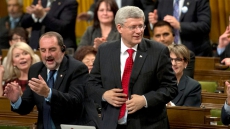ATLANTA — The Canadian government is eager enough to complete a historic trade agreement this week that the country's lead minister has no idea when he'll be back home campaigning in the federal election.
In his first full day at the meetings that could ultimately clinch the 12-country Trans-Pacific Partnership, Ed Fast said he's willing to stay as long as it takes.
He said he doesn't yet have a return plane ticket to British Columbia where he's in a re-election fight because, he says, completing the deal is critical to Canada's economy.
"What I can say is that Canada is prepared to negotiate, to stay here until we have a deal," the international trade minister said Wednesday.
"We believe we are on track to do so."
He insisted that he's also willing to walk away if necessary: "I can't prejudge whether there will be a deal this weekend... We are only going to sign a deal that is in our national interest."
Some countries are expressing a sense of urgency that a deal be completed now before several governments involved in the talks face uncertain re-election campaigns, starting with Canada's.
But the biggest impending concern for TPP proponents is the fast-approaching U.S. presidential primaries, which could play havoc with attempts to get the agreement ratified in Congress.
The Canadian government faces the dual pressure of having to run a campaign at the same time. While Fast chats about dairy and auto quotas in Atlanta, his colleagues back home are weighing the potential impact in dozens of ridings that could hold the key to Conservative re-election chances.

The government left the last talks dismayed by a surprise Japan-U.S. agreement that would have upended auto-production, with tariffs eliminated on cars that primarily use cheaper parts from non-TPP countries like China.
Fast called the last proposal unacceptable. He added Wednesday that there has been movement since the failed round in July: "We have continued to make progress," he said.
But the Canadian government also desperately wants to change the conversation.
It's attempting to steer attention toward companies and industries enthused by the TPP. It hopes those voices drown out some of the skeptics: the auto-workers union warning of lost middle-class jobs, and the dairy farmers urging against even a one-per-cent increase in foreign cheese imports.
The government has been circulating quotes from supportive stakeholders in multiple industries: mining, seafood, pork, cattle, and even from the bigger auto-parts companies with foreign plants.
One enthusiastic stakeholder is the Canadian beef industry. It predicts exports to Japan could potentially triple if tariffs fall as low as reported in Japanese media.
John Masswohl said the industry shipped $100 million to Japan last year — and lost almost 40 per cent in duties. But that's not the biggest issue: It's that Australia is gnawing away at everyone else's market share, he said, because it already has a tariff-reduction deal with Japan.
"It's a bad scenario for us if there is no TPP because Australia's rate continues to get lower and lower," said Masswohl, director of government relations for the Canadian Cattlemen's Association.
In Quebec and Ontario, the concerns of dairy farmers have received widespread media coverage. Those two provinces also happen to produce more than half of Canada's hogs.
And the pork producers are delighted.
Martin Rice of the Canadian Pork Council predicted that joining the TPP would increase the $1 billion in pork exports to Japan by more than 30 per cent within four years.
He warned that the exact opposite would happen if the TPP happens without Canada.
"Our processors just wouldn't be able to compete anymore," he said.
Expect to hear arguments like those from the Conservative party repeatedly in the last weeks of the federal election, should an agreement come together in Atlanta.
Another emerging debate has to do with transparency. The deal is being negotiated in secret; the final text might not even be made public before Canadians vote; and the government hasn't involved opposition parties despite the fact that one of them might actually have to implement the deal if they win Oct. 19.
Fast said Canada would push for the full text to be released instantly. He offered no guarantee when asked about consulting his election opponents.
Things to know about how the TPP could affect Canada's auto industry

Few details are known about the Trans-Pacific Partnership, but observers say the trade deal, currently under negotiation in Atlanta, could spell trouble for Canada's beleaguered automotive industry, with parts makers likely to bear the brunt of the pain.
Here are a few things to know about Canada's auto manufacturing sector — and how the TPP could impact it:
Economic impact: The manufacturing of vehicles and auto parts contributes roughly $20 billion to the country's GDP and directly employs 120,000 people, not including spin-off jobs, according to a 2014 report from the Automotive Policy Research Centre at McMaster University.
NAFTA: Under the North American Free Trade Agreement, or NAFTA, an auto part needed to contain 60 per cent North American content and a fully assembled vehicle needed to have 62.5 per cent North American-made content in order to remain duty free.
TPP: Japan has been pushing to allow for the tariff-free movement of vehicles and auto parts that contain as little as 30 per cent content produced in the countries that are part of the trade agreement. The risk is that Canadian auto parts makers will lose business to low-cost Asian producers that aren't part of the trade deal, such as China, Vietnam and Thailand.
Jobs: Canadian auto parts manufacturers employed roughly 81,700 people in 2014, according to a report from the Conference Board of Canada. Tony Faria, an auto industry expert at the University of Windsor, predicts that roughly 10,000 of those jobs could be at stake due to the TPP.
Challenges: In recent years, manufacturers of both auto parts and vehicles have been shifting production from Canada to Mexico and the southern United States, where labour costs are cheaper. More than 200 auto parts manufacturing facilities have been shuttered over the past decade, according to the Automotive Policy Research Centre, and layoffs have been made at assembly plants as well. General Motors announced in April that it will lay off 1,000 workers at its Oshawa plant as it shifts production of the Camaro to Michigan, and more job losses are expected.
Trade: Although Canada once exported more automotive products than it imported, the surplus shrank to a deficit in 2007 and has remained that way ever since. Some industry observers are concerned that the proposed trade deal could widen that deficit even further.
Quote: "Before actually seeing what comes out of the deal, it's really hard to say what the economic impact will be. It depends what the deal is and it depends where you are in the industry and what your business model is and what your business looks like. Without those details, it's hard to have a firm answer." Dina Ignjatovic, the auto sector economist at TD Economics
Things to know about Canada's dairy supply management system:

What is it: Supply management controls levels of milk production by tying it to Canadian consumer demand and limiting foreign competition through high tariffs. Similar systems also regulate production of cheese, poultry and eggs.
History: Canada established a national system in the early 1970s to stabilize prices and dairy producer incomes, although its origins can be traced to provincial marketing boards in place decades earlier.
Farms: The number of dairy farms has shrunk from 145,000 nearly 40 years ago to less than 13,000 today. The system supports 215,000 jobs and contributes about $19 billion to Canada's GDP and $3.6 billion in taxes. However, the Conference Board of Canada says dairy production quotas cost the economy $28 billion per year.
Prices: The price for milk paid to the producers is based on the costs of production set by farmers, not the market. As a result, Canadians pay about twice as much for milk than Americans. One litre of milk sold for $2.33 in Canada on average in August, according to Statistics Canada, compared to US$3.39 per gallon— or C$1.20 a litre — according to the U.S. Bureau of Labor Statistics. However, milk prices vary by province. This week's grocery flyers say filtered milk sells for about $5.49 for two litres in Quebec and $3.99 in Ontario.
Subsidies: Canadian dairy farmers receive no direct government subsidies, while the United States pays about US$4 billion a year and the European Union 55 billion euro to their farmers.
Imports: Imports are limited through high tariffs. The system originally banned all imports, but that ran afoul of global trade rules. So now about five per cent of dairy products on Canadian shelves are imported tariff-free. Another 18,500 tonnes of cheese will be imported from Europe under a proposed trade deal. That will mean European cheese will rise to nine from five per cent of cheese consumed in Canada.
Exports: Milk production caps limit export opportunities, especially to rapidly growing Asian markets. Global dairy export volumes have been growing by seven per cent annually, but the OECD projects that butter demand will increase 21 per cent from 2013 to 2022, cheese by more than 11 per cent and whole milk powder by 13 per cent. It said ending the system could see Canada add six to 12 billion more litres of milk annually and generate $1.3 billion in efficiency gains.

Quote: "Dairy Farmers of Canada does not oppose international trade; Canada has negotiated numerous trade deals in the past while maintaining the integrity of supply management. However, we will continue to stand firm on defending the interests of dairy farmers and the Canadian dairy supply management system. We oppose endangering the stability and viability of our industry." President Wally Smith.




